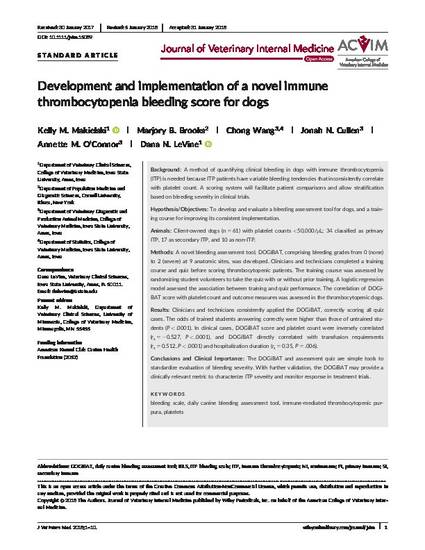
Background
A method of quantifying clinical bleeding in dogs with immune thrombocytopenia (ITP) is needed because ITP patients have variable bleeding tendencies that inconsistently correlate with platelet count. A scoring system will facilitate patient comparisons and allow stratification based on bleeding severity in clinical trials. Hypothesis/Objectives
To develop and evaluate a bleeding assessment tool for dogs, and a training course for improving its consistent implementation. Animals
Client‐owned dogs (n = 61) with platelet counts <50,000/μL; 34 classified as primary ITP, 17 as secondary ITP, and 10 as non‐ITP. Methods
A novel bleeding assessment tool, DOGiBAT, comprising bleeding grades from 0 (none) to 2 (severe) at 9 anatomic sites, was developed. Clinicians and technicians completed a training course and quiz before scoring thrombocytopenic patients. The training course was assessed by randomizing student volunteers to take the quiz with or without prior training. A logistic regression model assessed the association between training and quiz performance. The correlation of DOGiBAT score with platelet count and outcome measures was assessed in the thrombocytopenic dogs. Results
Clinicians and technicians consistently applied the DOGiBAT, correctly scoring all quiz cases. The odds of trained students answering correctly were higher than those of untrained students (P < .0001). In clinical cases, DOGiBAT score and platelet count were inversely correlated (rs = −0.527, P < .0001), and DOGiBAT directly correlated with transfusion requirements (rs = 0.512, P < .0001) and hospitalization duration (rs = 0.35, P = .006). Conclusions and Clinical Importance
The DOGiBAT and assessment quiz are simple tools to standardize evaluation of bleeding severity. With further validation, the DOGiBAT may provide a clinically relevant metric to characterize ITP severity and monitor response in treatment trials.
Available at: http://works.bepress.com/annette_oconnor/77/

This article is published as Makielski, Kelly M., Marjory B. Brooks, Chong Wang, Jonah N. Cullen, Annette M. O'Connor, and Dana N. LeVine. "Development and implementation of a novel immune thrombocytopenia bleeding score for dogs." Journal of Veterinary Internal Medicine (2018). doi: 10.1111/jvim.15089. Posted with permission.